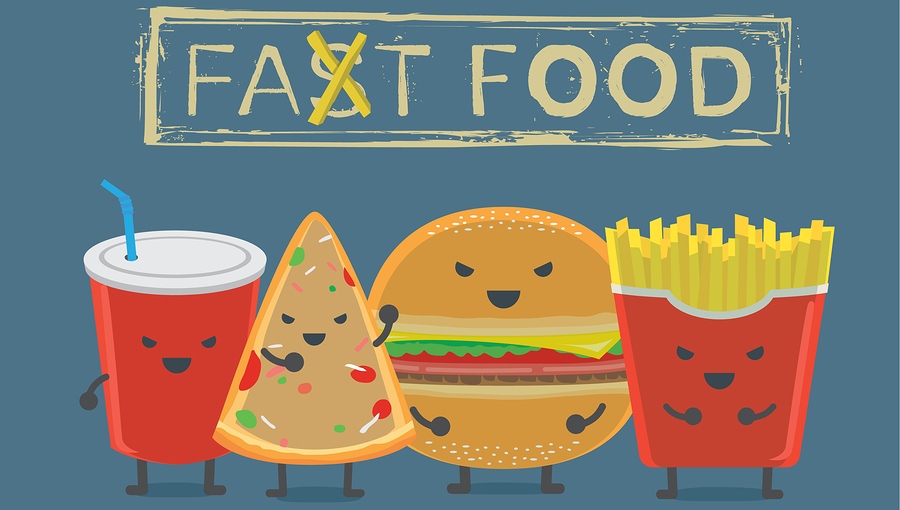
When it comes to eating healthy, one of the most dangerous habits people develop is depending on fast food for meals. In today’s society, fast food has become a quick replacement for eating a home-cooked meal.
As a result, we’re experiencing more problems with obesity and chronic illness than ever before. Heart disease, stroke, and diabetes have become some of the most serious problems we face as a society. This is the first generation in many that our life expectancy is actually decreasing.
While fast food certainly isn’t the only factor to consider, it’s definitely a major contributor to health problems. It’s important to take stock of your lifestyle and make sure you’re doing all you can to live the best life possible.
Why We Take the Fast Lane for Food
For many people, eating fast food is as habitual as brushing their teeth. In fact there are many families that eat most of their meals from a fast food restaurant. What is it about this lifestyle that’s appealing?
First, today our schedules are more hectic than ever. It’s not uncommon for a typical family of four to have activities to attend every night of the week. After coming home from work or school, you may only have a few minutes to spend before heading out again.
Enter fast food. When you need something quick, it’s easy to just hop in the car and grab a quick bite to eat on the way to your next stop. Most people don’t even take a few moments to eat something at a table.
The cost of fast food is also appealing for many people. Buying fresh, nutritious ingredients for meals can often break the family budget. Fast food companies have appealed to the thrifty family by offering dollar menu items that are less expensive than some home cooked meals.
Fast food companies have also capitalized on the flavors that our bodies crave. We are genetically engineered to love fat, sugar, and salt. These are essential nutrients, but in nature they aren’t that abundant.
We’re hard-wired to crave these nutrients and take them in whenever we can. Unfortunately, we’re no longer part of hunter-gatherer societies and the typical person can have access to these nutrients at any time.
That means that we tend to overindulge in the things that once were hard to come by. Fast food companies tend to serve meals loaded with extra fats, salt, and sugar and we keep them in business by eating them regularly.
Even if you don’t have a large family and activities to attend, you may find that after a long day of work you’re just too tired to cook a meal. Sometimes single people can be as much or more affected by the temptation to grab a quick bite on the way home.
Why You Should Say No to Fast Food
Fast food may seem like a friend to the busy family trying to save money. However, it’s really not as friendly as you might think. Eating fast food regularly has consequences that greatly outweigh its benefits to your lifestyle.
Here are a few problems with fast food:
- The average fast food meal can have as many calories as you need for an entire day
- Fast food meals tend to be high in saturated fat – that’s the fat that causes heart disease
- Food from fast food restaurants tends to have high amounts of preservatives
- Many fast food restaurants serve meat with fillers known as “pink slime” that are treated with harsh chemicals
- While many restaurants offer healthier choices, those choices are usually more expensive and not chosen as often
- Fast food meals don’t contain the necessary vitamins and minerals for good health
- Fast food meals don’t contain much fiber which helps to keep digestion regular and lower cholesterol
- The cost of treating medical conditions caused by a poor diet are much greater than any money you could save on a value menu
- For the first time in history, children are having problems due to obesity that once plagued only adults such as type 2 diabetes and high cholesterol
While it may seem convenient and inexpensive, the real cost of a fast food diet can be devastating for your health. It’s important to find a way to eat healthier foods that will fit into your lifestyle.
Making Good Nutrition a Part of Your Lifestyle
So, how can you have healthy food when your life is full of work, school, activities, and social occasions? You may find that it can be a challenge to change your lifestyle, but it will be a challenge you never regret.
The first thing you need to do is take a hard look at what’s going on in your life that’s making you so busy in the first place. Being overscheduled can affect more than just your diet. It can deprive you of sleep and increase your stress levels in an unhealthy way.
So make sure you’re not doing too much in the first place. Wherever you can, eliminate unneeded obligations. For example, you may want to limit your children to one after school activity instead of trying to do several.
You may also want to block off one night a week when you have no scheduled activities so that you can relax and have quality time. If you’re attending a lot of social gatherings, you may want to narrow it down to one or two that are most important to you each week or month.
Once you’ve pared down your schedule, you can begin to work on making nutrition a bigger priority in your household. It’s not as difficult as you may think – and the rewards of eating healthy will surprise you.
There are several things you can do to keep up with being busy and hectic without compromising on good nutrition. A few simple tips can help you to get the most out of your time and your budget.
- Plan ahead. When you plan ahead you can make sure to have ingredients on hand for making healthy meals. You may want to make a meal calendar that rotates on a weekly or monthly basis to stay organized.
- Keep quick, convenient foods on hand. When you’re on the go a lot, you need to have food that can be prepared quickly and eaten on the go. Stocking up on healthy foods such as yogurt, nuts, trail mix, granola bars, and plenty of fruits and veggies can help you be prepared to snack in between larger meals.
- Take advantage of crock-pot cooking. If you’re busy, there’s nothing easier than throwing a few ingredients into a crock-pot and letting it do the cooking for you. You’ll come home to a fully cooked meal ready to eat.
- Stock up on sale items. When you’re trying to stay on a budget, it’s important to take advantage of sales. When your favorite healthy foods go on sale, stock up. It helps to have a freezer so that you can store meats, fruits, and veggies for later use.
- Learn a few quick recipes. Having several recipes on hand that are easy to cook and quick can help you to stick to your plan of avoiding fast food. If you have a “go to” set of meals that you can always fall back on, you’ll be in good shape.
- Prepare meals ahead of time. Some people like to cook once a week for the rest of the week. You can make all of your meals on a weekend day or a day that’s just less hectic for you. Then throughout the week all you have to do is heat up your food.
- Have soup and sandwiches. This is a really quick dinner if you’re pressed for time. You can either make homemade soup or try prepared soup and add a quick sandwich. You’ll get a wholesome meal that doesn’t take much time or energy.
- Portion foods right after shopping. When you get home from the grocery store, wash and cut all of your produce. You can even store it in individually portioned bags or containers so you can grab it quickly on a busy night.
- Brown bag it. Many people do well with eating at home for breakfast and dinner, but falter when it comes to lunch. Make sure to pack a lunch so that you won’t feel pressure to grab a quick bite at a fast food restaurant. Packing lunch the night before can keep you from having to rush around in the morning.
By planning ahead and making the decision ahead of time that you’re not going to eat fast food, you can have healthy meals and adapt them to your busy lifestyle. You can even do so on a budget that meets your financial needs.
When You’re Caught Unprepared
Even the best-laid plans can go awry. If you find that you’re stuck in a situation where you aren’t prepared to eat a healthy meal from home, you can still be healthy. Most health experts would agree that eating an occasional fast food meal is not going to negatively impact your health.
But you may want to try to make better choices if you do find your vehicle in the fast food drive through. Most restaurants do have healthy choices if you’re looking for them. For example:
- Choose grilled items from the menu
- Opt for a side salad instead of fries with your meal
- Avoid the urge to “super-size” your meal
- Choose water or tea with your meal instead of soda
- Try eating a kids’ meal to get a smaller portion of food
- Add a fruit cup or apples to your meal
- Choose sandwiches that have are made of lean meats and vegetables
- Check the nutrition facts at the restaurant before ordering – some foods are deceptively high in fats and calories
If you find yourself busy and unprepared, you may also want to try a quick trip to the grocery store. Purchasing a rotisserie chicken and a bagged salad makes a very quick meal that will leave you feeling satisfied.
You may find other items in the deli that are healthier than fast food alternatives, but are convenient to purchase and take home. Ordering a pizza can also be a healthy alternative if you stick with a thinner crust, cheese, and veggies. Add a side salad and you have a solid meal choice.
Change Takes Time
If you find yourself making a commitment to eliminate fast food and then sliding back, don’t be too hard on yourself. It takes a long time to instill a new habit. You’re bound to have a few slipups along the way.
The important thing is that you keep trying. Eventually you’ll create a lifestyle that’s conducive to having great nutrition and is no longer in need of a quick meal through the drive through window.
Talking with other busy families can help you to get tips on eating a healthier diet. You might want to swap recipes and ideas with others experiencing the same thing. Having social support can help you to stick to your commitment.
The Benefits of Saying Yes to a Healthy Diet
Once you begin to let go of your fast food habit, you’ll begin to see immediate benefits. First you may notice that after meals you no longer feel weighed down by heavy foods. Healthy foods tend to leave you feeling light and energized while fast food tends to make you feel heavy and lethargic.
You may also enjoy one or more of the following benefits:
- Weight loss – you may find that you begin to lose weight without really focusing on it
- Lower cholesterol
- More energy
- Reduced risk of heart disease
- Reduced risk of diabetes and fewer problems if you’ve already been diagnosed
- More energy
When you say no to fast food and yes to a healthy diet, you’re choosing a life that’s free from many of the health problems associated with a diet high in calories, fat, and sodium. Eating healthy when you’re busy can be a challenge, but developing new habits will help you to succeed!


